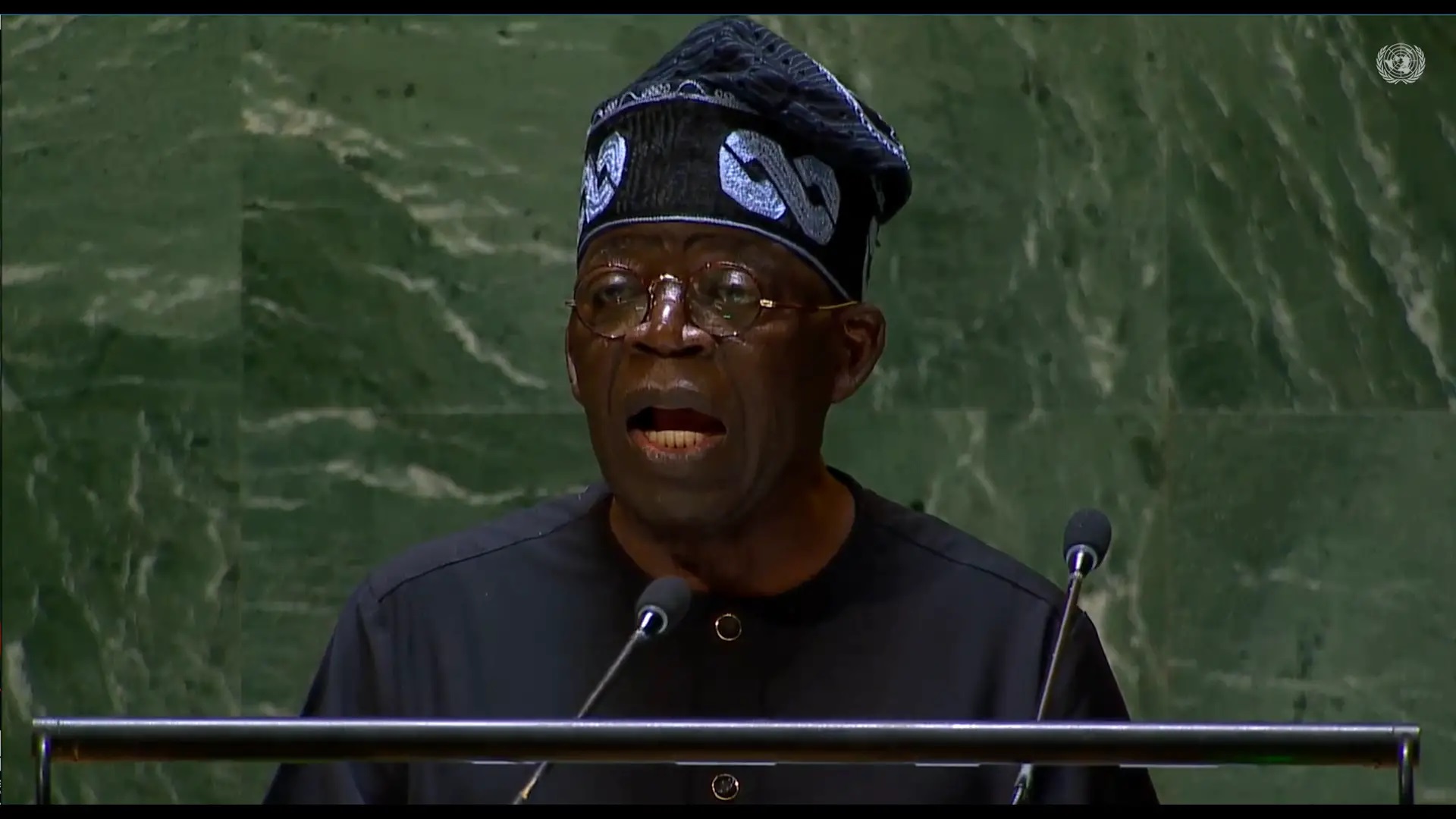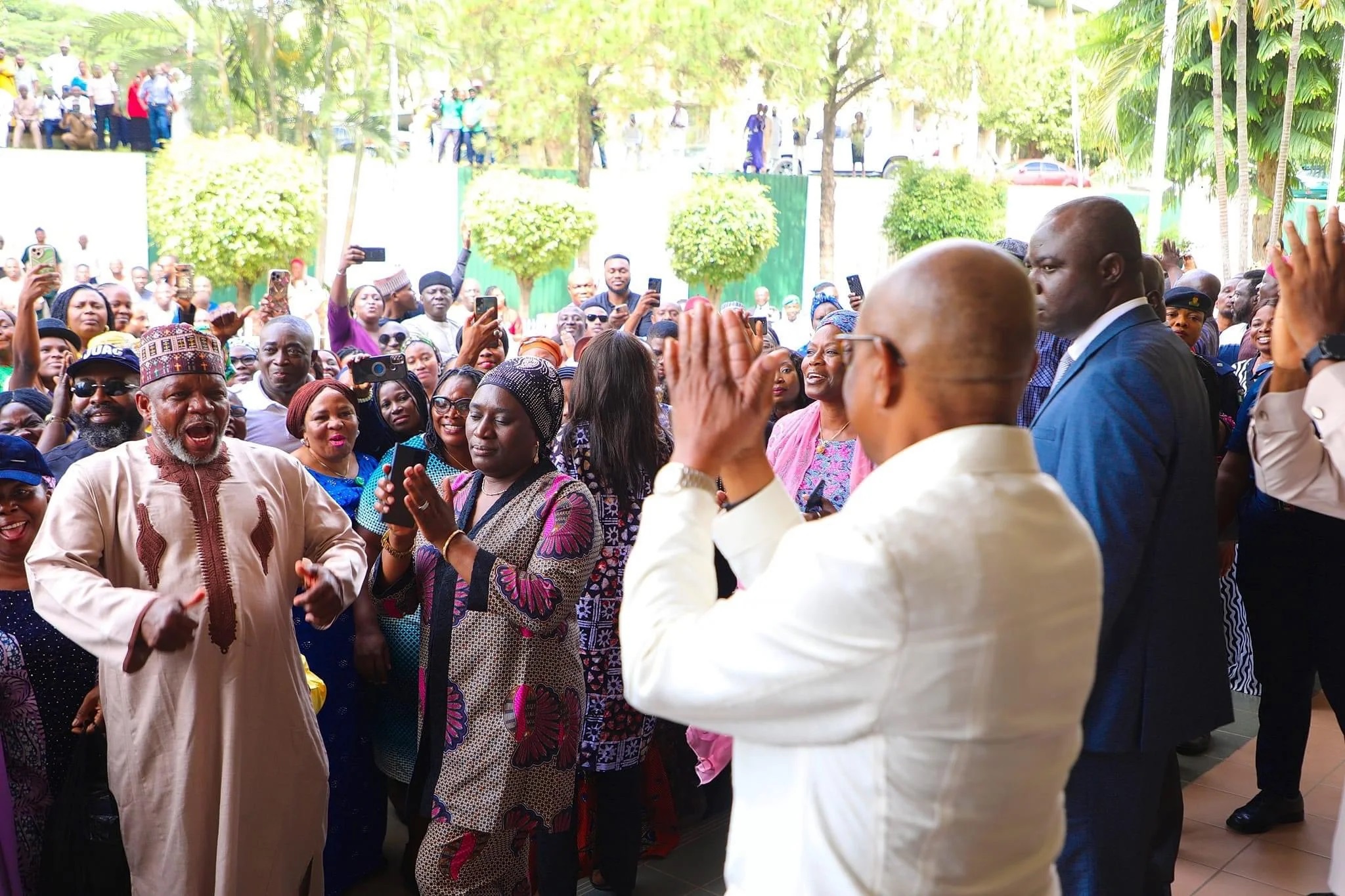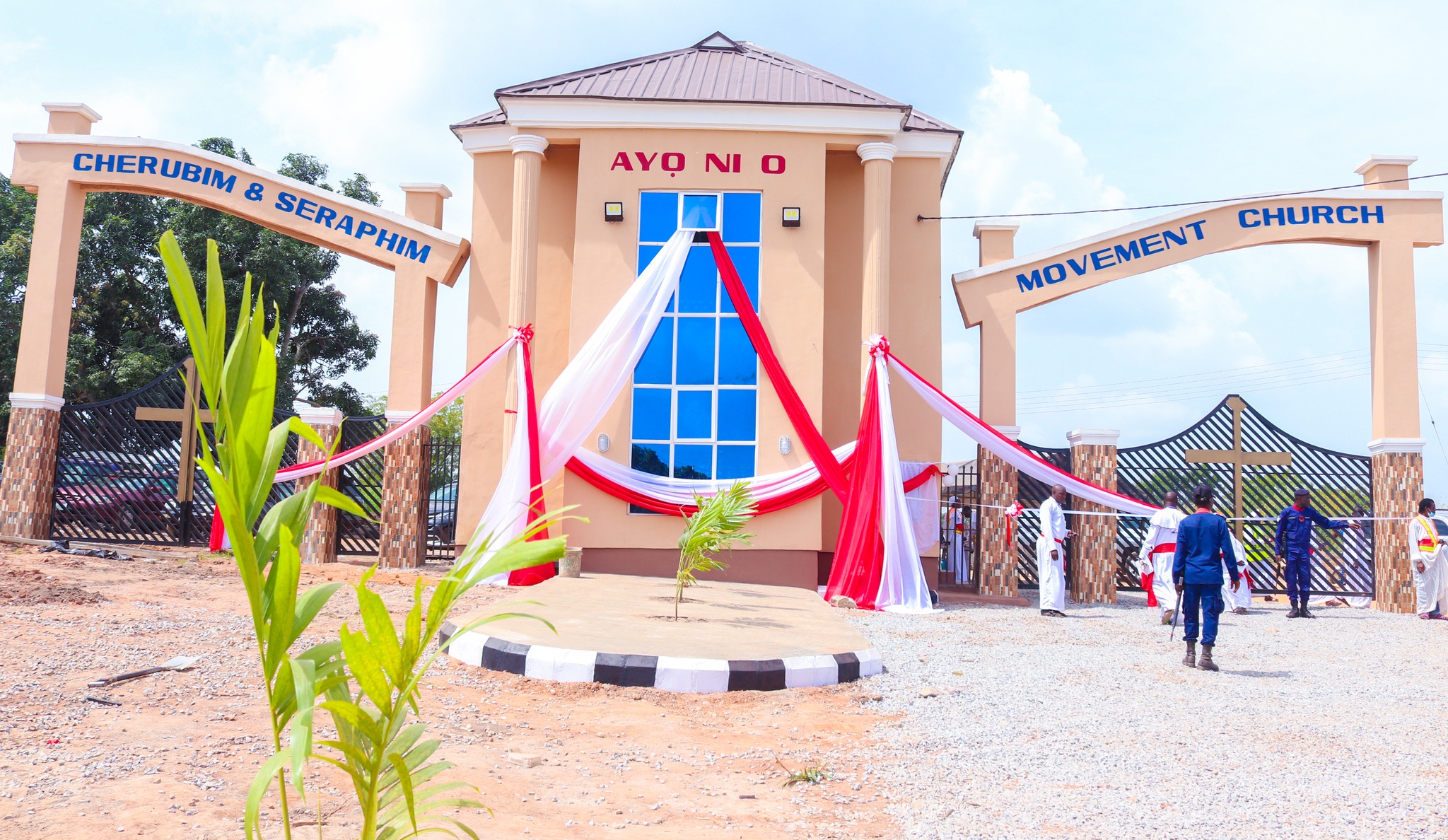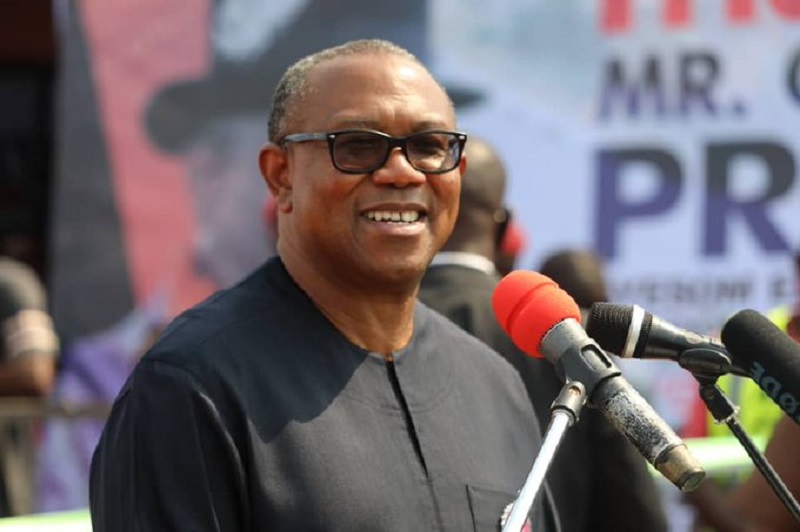General
Tinubu Promises Growth, Job, Climate Reforms

By Adedapo Adesanya
President Bola Tinubu has promised fresh growth and job reforms in the coming months after he removed fuel subsidies and directed the float of the Naira to unify the exchange rate.
The Nigerian president made this known during his first address at the 78th United Nations General Assembly in New York, the US, after he took over the helm of office from Mr Muhammadu Buhari in May.
He said, “To foster economic growth and investor confidence in Nigeria, I removed the costly and corrupt fuel subsidy while also discarding a noxious exchange rate system in my first days in office. Other growth and job-oriented reforms are in the wings.”
He acknowledged that these developments have come with hardships and reiterated that they were necessary for the country to reap long-term benefits as they would help bring investments into the country.
“I am mindful of the transient hardship that reform can cause. However, it is necessary to go through this phase to establish a foundation for durable growth and investment to build the economy our people deserve. We welcome partnerships with those who do not mind seeing Nigeria and Africa assume larger roles in the global community,” he said.
He called on nations to consider doing business with Nigeria as the country was interested in taking on investment in a mutual approach.
“The question is not whether Nigeria is open for business. The question is how much of the world is truly open to doing business with Nigeria and Africa in an equal, mutually beneficial manner.
“Direct investment in critical industries, opening their ports to a wider range and larger quantity of African exports and meaningful debt relief are important aspects of the cooperation we seek,” he said.
Speaking on the spate of recent coups on the African continent, Mr Tinubu called for more nations to support only democratically elected officials, adding that democracy was the ideal system.
“We must affirm democratic governance as the best guarantor of the sovereign will and well-being of the people. Military coups are wrong, as is any tilted civilian political arrangement that perpetuates injustice.
“The wave crossing parts of Africa does not demonstrate favour towards coups. It is a demand for solutions to perennial problems.
“Regarding Niger, we are negotiating with the military leaders. As Chairman of ECOWAS, I seek to help re-establish democratic governance in a manner that addresses the political and economic challenges confronting that nation, including the violent extremists who seek to foment instability in our region. I extend a hand of friendship to all who genuinely support this mission.”
On climate, President Tinubu spoke on its severe impacts on Nigeria and Africa, alluding to the recent disasters in Morocco and Libya.
He said, “Northern Nigeria is hounded by desert encroachment on once arable land. Our south is pounded by the rising tide of coastal flooding and erosion. In the middle, the rainy season brings floods that kill and displace multitudes.”
“African nations will fight climate change but must do so on our own terms. To achieve the needed popular consensus, this campaign must accord with overall economic efforts.
“In Nigeria, we shall build political consensus by highlighting remedial actions which also promote economic good. Projects such as a Green Wall to stop desert encroachment, halting the destruction of our forests by mass production and distribution of gas-burning stoves, and providing employment in local water management and irrigation projects are examples of efforts that equally advance both economic and climate change objectives.
“Continental efforts regarding climate change will register important victories if established economies were more forthcoming with public and private sector investment for Africa’s preferred initiatives,” he added.
General
NLC, TUC Suspend Planned Protest, Ask FCTA Workers to Resume

By Adedapo Adesanya
The Nigeria Labour Congress (NLC) and the Trade Union Congress (TUC) have suspended their planned protest in the Federal Capital Territory and instructed workers under the Federal Capital Territory Administration (FCTA) to return to their duties with immediate effect.
The directive followed an overnight engagement involving labour leaders, the Minister of the FCT, Mr Nyesom Wike, and members of the Senate Committee on the FCT.
The meeting, which began late on Monday, stretched into the early hours of Tuesday, culminating in an agreement that led to the unions’ decision to halt the protest action and restore normal activities across FCTA offices.
This comes after Justice Emmanuel Subilim of the National Industrial Court issued an interim order restraining the NLC, TUC, and three others from embarking on any form of industrial action or protest.
Ruling on an ex-parte application filed by the Minister of the FCT and the FCT Administration, Justice Subilim granted an interim order restraining the 1st to 5th respondents and their privies or agents from embarking on strike pending the hearing of the motion on notice, also ordering the 5th-9th defendants who are security agencies to ensure no break down of law and order.
The ex-parte motion, which was filed by the counsel to Mr Wike and the FCTA, Ogwu Onoja, submitted that the Chairman of the FCT council had sent a message of mobilization to members and affiliated unions for a mass protest scheduled for February 3.
This move, he noted, was in violation of the orders of court, adding that after the ruling of the court on January 27, the order of the court was served on the defendants, same day the NLC and TUC issued a statement to all affiliated unions to intensify and sustain the strike.
The statement jointly signed by both unions directed that the striking workers should resume the strike as the unions’ counsel, Mr Femi Falana, has filed an appeal against the interlocutory ruling.
He further pointed out that With the statement, JUAC issued a circular directing all employees to continue the strike.
This position they say is aimed at causing break down of law and order in the Nations capital.
The court subsequently adjourned the case until February 10 for hearing.
General
Church Confirms Release Of 151 Abducted Members in Kaduna

By Adedapo Adesanya
The Cherubim and Seraphim Movement Church Worldwide, Ayo Ni O, has confirmed the release and safe return of 151 of its members abducted from Iburu community in Kajuru Local Government Area of Kaduna State.
The abduction, which affected about 177 people, occurred on January 18, 2026. It was initially denied by the Nigeria Police Force and other government agencies, but was later confirmed.
In a statement issued by the Conference Secretary General of the church, Mr Anthony Olusesan Samaiye, it was disclosed that the release of the abducted persons was confirmed through reports from its liaison officers in Kaduna.
According to the statement, Mr Emmanuel Abiodun Adewale Alogbo (JP), described the release as a victory for faith, prayer and dialogue, noting that the breakthrough followed an emergency visit to Kaduna by its leadership and a series of high-level engagements aimed at securing the freedom of the abducted worshippers.
The Cherubim and Seraphim Church expressed gratitude to the Kaduna State government, particularly Governor Uba Sani, for what it described as his commitment to dialogue and the coordination of state resources that contributed to the successful outcome.
Special appreciation was also extended to the Governor’s Chief of Staff, Mr Sani Liman Kila, and the Senior Special Assistant on Religious Affairs (Christian Matters), Mr Ishaya Jangado, for facilitating engagement between the church and the state government.
The church noted that the incident demonstrated the importance of cooperation between religious leaders and government authorities in addressing security challenges and protecting citizens.
It also acknowledged prayers and support from the Christian Association of Nigeria (CAN), the Organisation of African Instituted Churches (OAIC), the international community and Christians worldwide.
While celebrating the release, the church said it was mindful of the trauma experienced by the victims and disclosed that its welfare and medical teams had been mobilised to provide psychosocial support and care to the affected members and their families.
The church called for sustained peace in Kaduna State and across Nigeria, urging authorities to continue efforts to ensure the safety of all citizens, regardless of religious affiliation.
General
2027 Elections: I Won’t be Vice Presidential Candidate—Peter Obi Insists

By Adedapo Adesanya
As activities for the 2027 general elections begin to take shape, the former presidential candidate of the Labour Party in the 2023 presidential poll, Mr Peter Obi, has again ruled out the possibility of contesting as a vice presidential candidate next year, saying he is contesting to be on the ballot.
Speaking ahead of the Abuja Municipal Area Council (AMAC) election in the Federal Capital Territory, he said, “You see this coming election, support us in AMAC; it will help me. Your support in AMAC is critical to our journey. I am involved and contesting the coming election as number one. When I come back, you will see. I assure you.”
Mr Obi vied for the 2023 presidency on the LP platform, emerging third overall behind Mr Atiku Abubakar and President Bola Tinubu.
In December 2025, he defected to the African Democratic Congress (ADC), where his teeming supporters popularly known as Obidients have urged him to only pursue the presidential ticket.
Mr Abubakar, who chose Mr Obi as his vice presidential candidate in the 2019 polls, is also a member of the ADC. The men finished in second and third places, respectively in the last presidential election, which President Tinubu won with 37 per cent of the votes.
Speaking at the campaign venue, Mr Obi emphasised to his supporters the importance of backing the ADC candidate in the AMAC election, noting that their support at the grassroots would go a long way in bolstering his national political journey.
The ADC coalition includes many former allies of Mr Tinubu, including Mr Nasir El Rufai, the former governor of Kaduna State; Mr David Mark, a former Senate President who is serving as the National Chairman of the party, and Mr Rauf Aregbesola, a former Osun Governor and currently the National Secretary of ADC.
The party will be hoping to emulate the success of the ruling All Progressives Congress (APC), which was formed by an alliance of opposition politicians (including Mr Abubakar) in 2013 and caused the ouster of former President Goodluck Jonathan, the first-ever defeat of an incumbent Nigerian president in 2015.
-

 Feature/OPED6 years ago
Feature/OPED6 years agoDavos was Different this year
-
Travel/Tourism9 years ago
Lagos Seals Western Lodge Hotel In Ikorodu
-

 Showbiz3 years ago
Showbiz3 years agoEstranged Lover Releases Videos of Empress Njamah Bathing
-

 Banking8 years ago
Banking8 years agoSort Codes of GTBank Branches in Nigeria
-

 Economy3 years ago
Economy3 years agoSubsidy Removal: CNG at N130 Per Litre Cheaper Than Petrol—IPMAN
-

 Banking3 years ago
Banking3 years agoSort Codes of UBA Branches in Nigeria
-

 Banking3 years ago
Banking3 years agoFirst Bank Announces Planned Downtime
-

 Sports3 years ago
Sports3 years agoHighest Paid Nigerian Footballer – How Much Do Nigerian Footballers Earn












